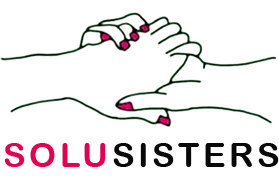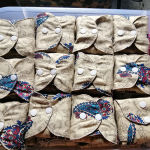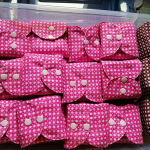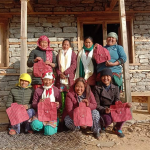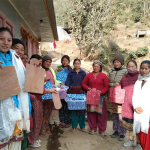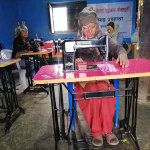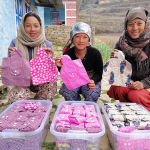Sanitary Pads
Eco- Pad making was started in 2019 with an objective to promote eco- friendly use of fabrics, washable and good for health. During September 2019, Dignified Menstruation training was provided to women from Radha foundation. This training helped to understand and be open to talk about the practices related to reproductive health, menstruation, menstruation hygiene management and use of cloth pad among women within the village. The training was provided to men as well in order to make women and men feel less hesitant to speak and understand on these topics among each other. This training was an initiation to think and regulate in a sustainable way. Therefore, eco-pad making concept originated and also Solu dudhkunda municipality had started the campaign to ban plastics in overall municipality area coverage and this was a wonderful opportunity to produce and promote use of eco-pad. At first, 5 women from Chyangsar within the cooperative were provided 5 days residential training at HASERA, Kavre district. The training was provided by the team of’ Dhartimata’. This is a brand name of eco- pad produced at HASERA. After the training was completed, the cooperative had immediately signed MOU with the municipality stating that municipality will purchase the pad produced by the cooperative and those pads will be distributed by the municipality to the girls of community schools. The work has been running very smoothly with good coordination between municipality and cooperative.
Until the end of 2020, 1000 quantities of pads has been produced and handover to municipality. Also women of village purchase and use it. The recommendation has been very positive by the users.
From September 2020, eco –pad making centres was extended in Ghunsa and Merangding village. The women involved in mask making were trained in pad making as well. The training was provided by chyangsar women who were trained in HASERA. The training was successful in all village. In Eco- pad making, Chyangsar is the main centre and remaining three village are the sub centres. All sub centres should coordinate with main centre if they get any order. Main centre will provide the fabrics and all materials required for pad making. One pad cost Rs 180. All centres will get the wage of pads they make and the remaining money will be used to purchase the materials and 30% money from each pad will be saved as cooperative fund. This structure has already come into practise.
